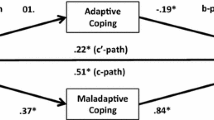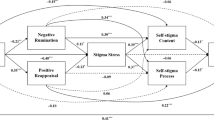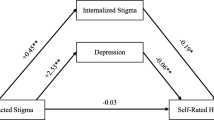Abstract
The goal of this study was to analyze the relationships to be found among stigma perception, active and avoidant coping strategies, and subjective and psychological well-being in a sample of 133 people with HIV. The results showed that stigma perception and avoidant coping strategies (venting, self-blame, denial, behavioural disengagement and substance use) were positively associated, whereas, both stigma perception and avoidant coping were negatively associated with different measures of well-being (affect balance, self-acceptance and environmental mastery). These negative relationships between stigma perception and the three well-being measures were mediated by the use of avoidant coping strategies. Results suggest that psychosocial intervention programs for people who report psychological distress arising from prejudice must be aimed at developing appropriate ways to deal with this prejudice. Intervention programs should also include strategies to directly increase well-being since from a positive psychology viewpoint certain interventions have been shown to do so, and HIV research has also shown that well-being is associated with lower mortality rates.



Similar content being viewed by others
References
Abbey, A., Amdrews, F. M., & Halman, J. (1991). The importance of social relationships for infertile couples’ well-being. In A. L. Stanton & C. Dunkel-Schetter (Eds.), Infertility: Perspectives from stress and coping research. New York: Plenum Press.
Anderson, G. (1996). The benefits of optimism: A meta-analytic review of the life orientation test. Personality and Individual Differences, 21, 719–725.
Ashton, E., Vosvick, M., Chesney, M., Gore-Felton, C., Koopman, C., O’Shea, K., et al. (2005). Social support and maladaptive coping as predictors of the change in physical health symptoms among persons living with HIV/AIDS. AIDS Patients Care and STDs, 19, 587–598.
Baron, R., & Kenny, D. (1986). The moderator-mediator variable distinction in social psychological research: Conceptual, strategic, and statistical considerations. Journal of Personality and Social Psychology, 51, 1173–1182.
Berger, B., Ferrans, C., & Lashley, F. (2001). Measuring stigma in people with HIV: Psychometric assessment of the HIV Stigma Scale. Research in Nursing & Health, 24, 518–529.
Bos, A., Schaalma, H., & Pryor, J. (2008). Reducing AIDS-related stigma in developing countries: The importante of theory- and evidence-based interventions. Psychology, Health & Medicine, 13, 450–460.
Brincks, A., Feaster, D., & Mitrani, V. (2010). A multilevel mediation model of stress and coping for women with HIV and their families. Family Process, 49, 517–529.
Bunn, J., Solomon, S., Miller, C., & Forehand, R. (2007). Measurement of stigma in people with HIV: A re-examination of the HIV Stigma Scale. AIDS Education and Prevention, 19, 198–208.
Carver, C. (1997). You want to measure coping but your protocol’s too long: Consider the brief COPE. International Journal of Behavioral Medicine, 4, 92–100.
Carver, C. S., Scheier, M. F., & Weintraub, J. K. (1989). Assessing coping strategies: A theoretically based approach. Journal of Personality and Social Psychology, 56, 267–283.
Chamberlain, J., & Haaga, D. (2001). Unconditional self-acceptance and psychological health. Journal of Rational Emotive and Cognitive Behavior Therapy, 19, 163–176.
Chida, Y., & Steptoe, A. (2008). Positive psychological well-being and mortality: A quantitative review of prospective observational studies. Psychosomatic Medicine, 70, 741–756.
Chida, Y., & Vedhara, K. (2009). Adverse psychosocial factors predict poorer prognosis in HIV disease: A meta-analytic review of prospective investigations. Brain, Behavior, and Immunity, 23, 434–445.
Compton, W. (1998). Measures of mental health and a five factor theory of personality. Psychological Reports, 83, 371–381.
Díaz, D., Rodríguez, R., Blanco, A., Moreno, B., Gallardo, I., Valle, C., et al. (2006). Spanish adaptation of Ryff′s Scales of psychological well-being. Psicothema, 18, 572–577.
Diener, E. (2000). Subjective well-being. The science of happiness and proposal for a national index. American Psychologist, 55, 34–43.
Diener, E., Suh, E. M., Lucas, R. E., & Smith, H. L. (1999). Subjective well-being: Three decades of progress. Psychological Bulletin, 125, 276–302.
Diener, E., Lucas, R., & Oishi, S. (2002). Subjective well-being: The science of happiness and life satisfaction. In C. R. Snyder & S. J. Lopez (Eds.), Handbook of positive psychology (pp. 63–73). New York: Oxford University Press.
Emmons, R. (2008). Gratitude, subjective well-being and the brain. In M. E. Eid & R. J. Larsen (Eds.), The science of subjective well-being (pp. 469–489). New York: Guilford Press.
Folkman, S., & Moskowitz, J. (2000). Positive affect and the other side of coping. American Psychologist, 55, 647–654.
Fredrickson, B. (2008). Promoting positive affect. In M. E. Eid & R. J. Larsen (Eds.), The science of subjective well-being (pp. 449–468). New York: Guilford Press.
Fredrickson, B., Mancuso, R., Branigan, C., & Tugade, M. (2000). The undoing effect of positive emotions. Motivation and Emotion, 24, 237–258.
Grant-Smith, N., Tarakeshwar, N., Hansen, N., Kochman, A., & Sikkema, K. (2009). Coping mediates outcome following a randomized group intervention for HIV-positive bereaved individuals. Journal of Clinical Psychology, 65, 319–335.
Heckhausen, J., & Schulz, R. (1995). A life-span theory of control. Psychological Review, 102, 284–304.
Heine, S. J., Kitayama, S., Lehman, D. R., Takata, T., Ide, E., Leung, C., et al. (2001). Divergent consequences of success and failure in Japan and North America: An investigation of self-improving motivations and malleable selves. Journal of Personality and Social Psychology, 81, 599–615.
Herrington, R., Mitchell, A., Castellani, A., Joseph, J., Snyder, D., & Gleaves, D. (2008). Assessing disharmony and disaffection in intimate relationships: Revision of the marital satisfaction inventory factor scales. Psychological Assessment, 20, 341–350.
Hildingh, C., Segesten, K., & Fridlund, B. (1997). Elderly persons’ social network and need for social support after their first myocardial infarction. Scandinavian Journal of Caring Sciences, 11, 5–11.
Ironson, G., & Hayward, H. (2008). Do positive psychosocial factors predict disease progression in HIV-1? A review of the evidence. Psychosomatic Medicine, 70, 546–554.
Ironson, G., O’Cleirigh, C., Fletcher, M., Laurenceau, J., Balbin, E., Klimas, N., et al. (2005). Psychosocial factors predict CD4 and viral load change in men and women with human immunodeficiency virus in the era of highly active antiretroviral treatment. Psychosomatic Medicine, 67, 1013–1021.
Keyes, C. (2002). The mental health continuum: From languishing to flourishing in life. Journal of Health and Social Behavior, 43, 207–222.
Keyes, C., Shmotkin, D., & Ryff, C. (2002). Optimizing well-being: The empirical encounter of two traditions. Journal of Personality and Social Psychology, 82, 1007–1022.
King, L. (2008). Interventions for enhancing subjective well-being. In M. E. Eid & R. J. Larsen (Eds.), The science of subjective well-being (pp. 431–448). New York: Guilford Press.
Kraaij, V., Van Deer Veek, S., Garnefski, N., Schroevers, M., Witlok, R., & Maes, S. (2008). Coping, goal adjustment, and psychological well-being in HIV-infected men who have sex with men. AIDS Patient Care and STDs, 22, 395–402.
Lazarus, R. (1999). Stress and emotion: A new synthesis. New York: Springer.
Lazarus, R., & Folkman, S. (1984). Stress, appraisal, and coping. New York: Springer.
Litman, J., & Lunsford, G. (2009). Frequency of use and impact of coping strategies assessed by the COPE inventory and their relationships to post-event health and well-being. Journal of Health Psychology, 14, 982–991.
Logie, C., & Gadalla, T. (2009). Meta-analysis of health and demographic correlates of stigma towards people living with HIV. AIDS Care, 21, 742–753.
Lyubomirsky, S., Sheldon, K., & Schkade, D. (2005). Pursuing happiness: The architecture of sustainable change. Review of General Psychology, 9, 111–131.
Mak, W., Poon, C., Pun, L., & Cheung, S. (2007). Meta-analysis of stigma and mental health. Social Science and Medicine, 65, 245–261.
Miller, C., & Major, B. (2000). Coping with stigma and prejudice. In T. Heatherton, R. Kleck, M. Hebl, & J. Hull (Eds.), The social psychology of stigma (pp. 243–272). New York: Guilford Press.
Molero, F., Fuster, M., Jetten, J., & Moriano, J. (2011). Living with HIV/Aids: A psychosocial perspective on coping wiht prejudice and discrimination. Journal of Applied Social Psychology, 41, 609–626.
Molero, F., Recio, P., García-Ael, C., Fuster, M. & Sanjuán, P. (2012). Dimensions of perceived discrimination in stigmatized groups: Personal vs. group and blatant vs. subtle discrimination. Manuscript submitted for publication.
Morán, C., Landero, R., & González, M. (2010). COPE-28: A psychometric analysis of Brief-COPE Spanish version. Universitas Psychologica, 9, 543–552.
Moskowitz, J. (2003). Positive affect predicts lower risk of AIDS mortality. Psychosomatic Medicine, 65, 620–626.
Moskowitz, J., Hult, J., Bussolari, C., & Acree, M. (2009). What works in coping with HIV? A meta-analysis with implications for coping with serious illness. Psychological Bulletin, 135, 121–141.
Pakenham, K., & Rinaldis, M. (2001). The role of illness, resources, appraisal, and coping strategies in adjustment to HIV/AIDS: The direct and buffering effects. Journal of Behavioral Medicine, 24, 259–279.
Pascoe, E. A., & Smart Richman, L. (2009). Perceived discrimination and health: A meta-analytic review. Psychological Bulletin, 135, 531–554.
Pérez, A. & Sanjuán, P. (2012) Psychometric properties of Brief-COPE Spanish version. Manuscript submitted for publication.
Rogers, M., Hansen, N., Levy, B., Tate, D., & Sikkema, K. (2005). Optimism and coping with loss in bereaved HIV-infected men and women. Journal and Social and Clinical Psychology, 24, 341–360.
Rothbaum, F., Weisz, J., & Snyder, S. (1982). Changing the world and changing the self: A two process model of perceived control. Journal of Personality and Social Psychology, 42, 5–37.
Ryan, R., & Deci, E. (2001). On happiness and human potentials: A review of research on hedonic and eudaimonic well-being. Annual Review of Psychology, 52, 141–166.
Ryff, C. (1989a). Beyond Ponce de León and life satisfaction. New directions in quest of successful aging. International Journal of Behavioral Development, 12, 35–55.
Ryff, C. (1989b). Happiness is everything, or is it? Explorations of the meaning of psychological well-being. Journal of Personality and Social Psychology, 57, 1069–1081.
Sandin, B., Chorot, P., Lostao, L., Joiner, T. E., Santed, M., & Valiente, R. (1999). Positive and Negative Affect Scales (PANAS): Factorial validity and cross-cultural convergence. Psicothema, 11, 37–51.
Sanjuán, P. (2011). Affect balance as mediating variable between effective psychological functioning and satisfaction with life. Journal of Happiness Studies, 12, 373–384.
Sanjuán, P., Arranz, H., & Castro, A. (2011a). Pessimistic attributions and coping strategies as predictors of depressive symptoms in people with coronary heart disease. Journal of Health Psychology. doi:10.1177/1359105311431175.
Sanjuán, P., Ruiz, M. A., & Pérez, A. (2011b). Life satisfaction and positive adjustment as predictors of emotional distress in men with coronary heart disease. Journal of Happiness Studies, 12, 1035–1047.
Schimmack, U., & Diener, E. (1997). Affect intensity: Separating intensity and frequency in repeatedly measured affect. Journal of Personality and Social Psychology, 73, 1313–1329.
Seligman, M., & Csikszentmihalyi, M. (2000). Positive psychology: An introduction. American Psychologist, 55, 5–14.
Skinner, E., Edge, K., Altman, J., & Sherwood, H. (2003). Searching for the structure of coping: A review and critique of category systems for classifying ways of coping. Psychological Bulletin, 129, 216–269.
Sobel, M. (1988). Direct and indirect effects in linear structural equation models. In J. Long (Ed.), Common problem/proper solutions: Avoiding error in quantitative research (pp. 46–64). Beverly Hills, CA: Sage.
Stanton, A., Revenson, T., & Tennen, H. (2007). Health psychology: Psychological adjustment to chronic disease. Annual Review of Psychology, 58, 565–592.
Van Dierendonck, D., Díaz, D., Rodríguez, R., Blanco, A., & Moreno, B. (2008). Ryff’s six-factor model of psychological well-being: A Spanish exploration. Social Indicators Research, 87, 473–479.
Vanable, P., Carey, M., Blair, D., & Littlewood, R. (2006). Impact of HIV-related stigma on health behaviours and psychological adjustment among HIV-positive men and women. AIDS and Behavior, 10, 473–482.
Veenhoven, R. (2008). Healthy happiness: Effects of happiness on physical health and the consequences for preventive health care. Journal of Happiness Studies, 9, 449–469.
Vosvick, M., Gore-Felton, C., Koopman, C., Thoresen, C., Krumboltz, J., & Spiegel, D. (2002). Maladaptive coping strategies in relation to quality of life among HIV-adults. AIDS and Behavior, 6, 97–106.
Watson, D., Clark, L. A., & Tellegen, A. (1988). Development and validation of brief measures of positive and negative affect. The PANAS scales. Journal of Personality and Social Psychology, 54, 1063–1070.
World Health Organization. (1948). Constitution of the World Health Organization. Retrieved on June 24, 2011 from http://www.searo.who.int/LinkFiles/ABOUT_SEARO_const.pdf.
Xu, J., & Roberts, R. (2010). The power of positive emotion: It’s a matter of life or death—subjective well-being and longevity over 28 years in a general population. Health Psychology, 29, 9–19.
Yi-Frazier, J., Smith, R., Vitaliano, P., Yi, J., Mai, S., Hillman, M., et al. (2010). A Person-focused analysis of resilience resources and coping in patients with diabetes. Stress and Health, 26, 51–60.
Acknowledgments
Work on this paper was supported by a Spanish Science and Innovation Ministry Grant (number PSI2008-02966).
Author information
Authors and Affiliations
Corresponding author
Rights and permissions
About this article
Cite this article
Sanjuán, P., Molero, F., Fuster, M.J. et al. Coping with HIV Related Stigma and Well-Being. J Happiness Stud 14, 709–722 (2013). https://doi.org/10.1007/s10902-012-9350-6
Published:
Issue Date:
DOI: https://doi.org/10.1007/s10902-012-9350-6




